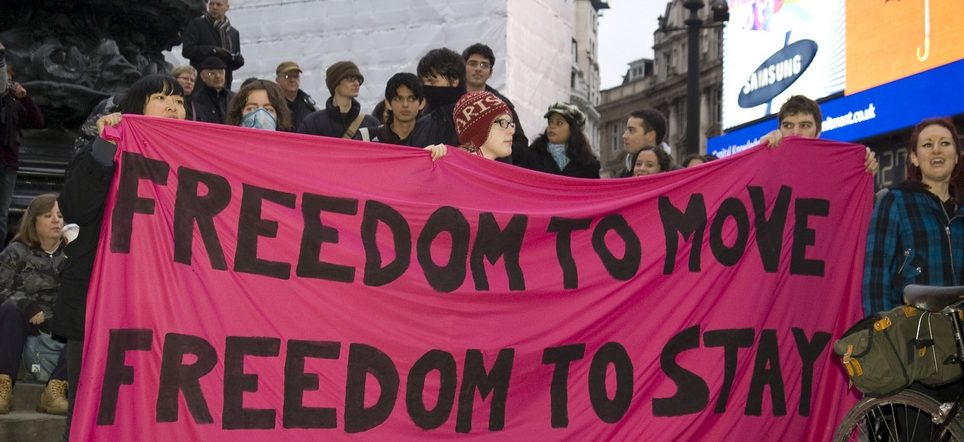No more triangulation: only an unapologetic defence of migration will do
Posted: 2 November 2017

Ben Towse, Labour Campaign for Free Movement
Labour’s unprecedented turnaround in this summer’s election should have been the final nail in the coffin for the strategy of responding to the right with triangulation. For too long, received wisdom has urged us to moderate our vision and our message, to approach right-wing sentiments by offering fudges and partial concessions rather than bold and persuasive alternatives. But this year, we surged from dismal polling to within a hair’s breadth of government by refusing to let the Tories keep setting the narrative. We went on the offensive, armed with our most radical programme in decades, and against all the “common sense” predictions, we won hearts, minds and seats.
It is in this context that we should assess the approach to migration policy put forward by Catherine Barnard in a recent article for Progress, and endorsed by Progress Director Richard Angell. Barnard sets out a strategy to win the argument for retaining single market membership and the free movement framework that comes with it. She says that Labour should pacify desires to “take control” over migration by proposing to activate constraints that are allowed within EU rules but as-yet unused in the UK.
EU and EEA rules permit a number of restrictions on the rights of migrants. Member states can require migrants residing longer than three months to register with authorities (but only if a similar requirement exists for host country nationals); can require them to leave after six months if they have had no luck finding work and cannot show they have a real chance of succeeding; and can remove migrants who are not working if they are drawing on the country’s social assistance system (i.e. means-tested benefits). Barnard wants Labour to use such powers, along with possible others such as ID cards, to end a perceived “free for all”. Disturbingly, Home Office use of charities’ data to deport EU migrants for the offence of being homeless is highlighted not as a moral crime (and potentially actually unlawful), but as a shift in what is implied to be the right direction.
The basic logic of this approach is to take it as read that the electorate wants anti-migrant measures and that Labour has little choice but to yield and offer some up. It seems to prioritise defending the institutional and legal framework of free movement over defending the actual right and ability of workers to move, live and work across borders. Here, I want to set out why I believe that this would be profoundly wrong, and why the alternative proposed by the Labour Campaign for Free Movement is what we need.
Barnard talks about responding to the “perception” that immigration from the EU has been the cause of problems like unemployment, overstretched public services, and the erosion of workplace rights, conditions and wages. But it is just that – a perception.
In reality, detailed study shows no substantial link between immigration from the EU and wage cuts, unemployment, or deterioration in public services. The big lie about migrant workers has been pushed by the Tories, UKIP and the far right, and it serves to distract attention from the real culprits: the rich and powerful who are hoarding wealth and grinding down conditions for the rest of us who they exploit.
For our movement to prop up and appease this lie is a betrayal of both migrant and UK-born workers. Instead of undermining the rights of blameless migrants, which will do nothing to help UK-born workers, we need to expose the truth and offer policies that really will tackle injustice.
In fact, by rendering migrant workers more precarious, measures like Barnard’s could actually drag down wages and conditions for everyone. A migrant worker who faces deportation if unemployed for too long will be easier for unscrupulous employers to hyper-exploit and play off against UK-born workers. They are less likely to quit in search of better work, and less likely to risk victimisation by unionising and sticking their necks out for better pay, hours or conditions.
More generally, history shows that Barnard and Angell’s strategy of appeasement cannot work. Recent decades have seen the rise of UKIP and anti-migrant politics, culminating in the Brexit vote and the mainstreaming and legitimisation of what would previously have been considered unthinkably xenophobic positions. Efforts by Labour to keep up by triangulating and making concessions only allowed the political centre to slide relentlessly rightwards. We must learn the lesson: feeding the beast of anti-migrant sentiment only makes it bigger. We will only beat the right by uncompromisingly confronting it – and the longer we put that off, the harder the task will be.
The Labour Campaign for Free Movement was founded to do that. We stand for defending and extending the free movement of people. That means maximising, not minimising migrant rights. We’re not looking for ways to ramp up restrictions: on the contrary, we’re looking to reduce restrictions on non-EU migrants too. It’s why our proposal to September’s party conference argued that as well as retaining existing EU free movement, we should welcome migration from beyond the walls of Fortress Europe and end policies like charges to access the NHS, barbaric detention centres, refusal of access to benefits, and the use of landlords and health workers as border guards. We must respond to the dishonest promises of xenophobes with real solutions: well-paid, secure jobs for everyone with better conditions; stronger and freer trade unions; and massive investment in council housing, public services and infrastructure.
Labour must be straightforward and honest. Undermining migrant workers will not solve any of the problems of UK-born workers. Uniting both and setting our sights on the true culprits will.